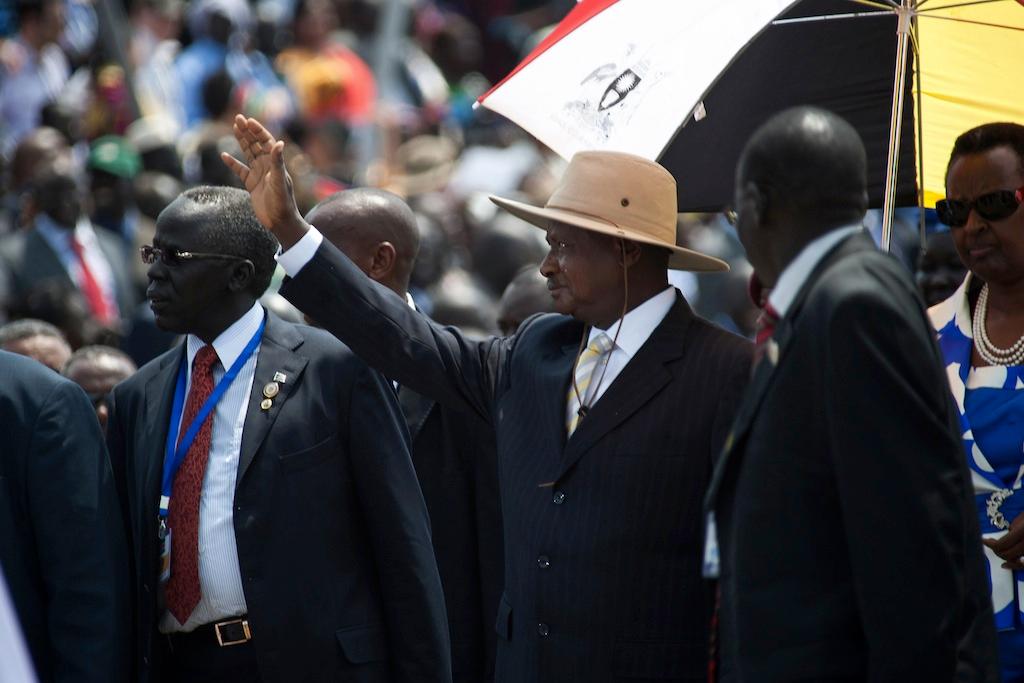Uganda: New front in war on corruption
Successes by lawmakers against corruption may signal a weakening of Ugandan President Yoweri Museveni’s power. He is shown here in Juba, South Sudan, on July 9, 2011.
KAMPALA, Uganda — A year ago Uganda’s most eminent anti-corruption judge, apparently bored by the lack of elite suspects, stared down his courtroom and complained that he was tired of frying small fish when crocodiles were left swimming.
Justice J.B. Katutsi, who has since retired, would have relished the prevailing current in Kampala, where several ministers have either resigned or have been dragged to court for alleged corruption.
In a highly dramatic chain of events at the end of 2011, a bipartisan effort to bring transparency to Uganda’s emerging oil sector uncovered hints of massive bribery and left the accused ministers barely able to claim innocence.
A vibrant session in parliament recently resolved to block new deals between the government and foreign oil companies until certain laws are passed. For those watching, this development was as strange as it was bewildering: What did President Yoweri Museveni make of the radical actions of his own lawmakers? Can the legislators sustain the pressure and widen their cause?
In short, how real is this new front in the war on corruption? Will the anti-corruption drive change how Museveni's government operates in 2012?
More: Ugandan opposition leader arrested
“It’s a welcome move,” said Nandala Mafabi, who heads the opposition in parliament. “I think the young ones are seeing that the corruption problem is destroying them and will destroy their grandchildren. From now on this country will be a different state.”
The petition to scrutinize the country’s agreements with a couple of oil companies was brought by mostly youthful lawmakers on both sides of the political spectrum. Their popular campaign, which went against the expressed wishes of the government, forced the speaker to convene a special session of parliament that was noted for its united stand against corruption.
The day after numerous resolutions were passed and some of his ministers had to resign under the weight of various allegations, Museveni was forced to address the country on alleged sleaze in the oil sector.
More: Ugandan ministers charged with corruption
There is considerable room for improvement as Uganda is ranked a lowly 143 on Transparency International's 2011 Corruption Perception Index. But analysts say that Museveni, far from being serious about the anti-graft war, will see the events of November as a challenge to his authority.
Frequently asked by donors to crack the whip on corrupt officials in his cabinet, a job he has done selectively and fitfully, Museveni was reduced to a witness as a bunch of lawmakers took the fight to some of his most trusted associates.
An intricate web of family connections and lifelong bonds has complicated Museveni’s ostensible wish to tame corruption. The daughter of scandal-prone Sam Kutesa, the foreign affairs minister, is married to Museveni’s son. And Prime Minister Amama Mbabazi, who is accused of taking a bribe from an oil company, is said to be Museveni’s favorite protégé.
The lawmakers’ crusade against the ministers is not only an indictment of the accused; it is also a very public repudiation of Museveni’s leadership and an indicator of his diminished stature.
More: Amnesty International slams Uganda's press crackdown
“Museveni is becoming very weak,” said Ladislaus Rwakafuuzi, a political analyst. “Sometime back very few people would have had that kind of courage. There are things happening in Uganda today that Museveni does not want to happen.”
The allegations of a corrupt oil sector have echoed against a background of tough times in Uganda, where a sick economy has ruined small businesses and left families groping for quick solutions. Museveni’s recent reelection campaign injected a lot of cash into the economy through a bribery scam that is partly responsible for the shilling’s constant loss of value against the dollar.
Most recently, donors have demanded action on a financial scam that stems from the 2007 Commonwealth summit in Kampala. A parliamentary inquiry reported that millions of dollars had been misused by government officials who organized the conference. Former Vice President Gilbert Bukenya was jailed briefly over the scandal. Three ministers, who have since stepped down, have appeared before a magistrate to answer corruption charges.
Asked during a press conference what he thought of the ministers’ resignations, Museveni gave a blank stare and said simply, “That is their view.” The answer confounded critics expecting a thoughtful response from a president who claims to be firmly against corruption.
“Corruption is a tool for consolidating power in Uganda,” said Mwambutsya Ndebesa, a political historian at Makerere University in Kampala.
Cissy Kagaba, who heads a watchdog called Anti-Corruption Coalition of Uganda, does not expect much to come out of the current anti-corruption wave. The lack of strong institutions — the Inspectorate of Government, for example, lacks independence and its head is still waiting to be confirmed for the job — has led her to believe that the actions of lawmakers are meaningless without a change in the culture.
Watching the drama in parliament, Kagaba found it hard to take the lawmakers seriously.
“What happened in parliament is a reaction in the heat of passion,” she said. “Whether this movement is going to continue I am a bit skeptical. Following through has always been a challenge.”
We want to hear your feedback so we can keep improving our website, theworld.org. Please fill out this quick survey and let us know your thoughts (your answers will be anonymous). Thanks for your time!
